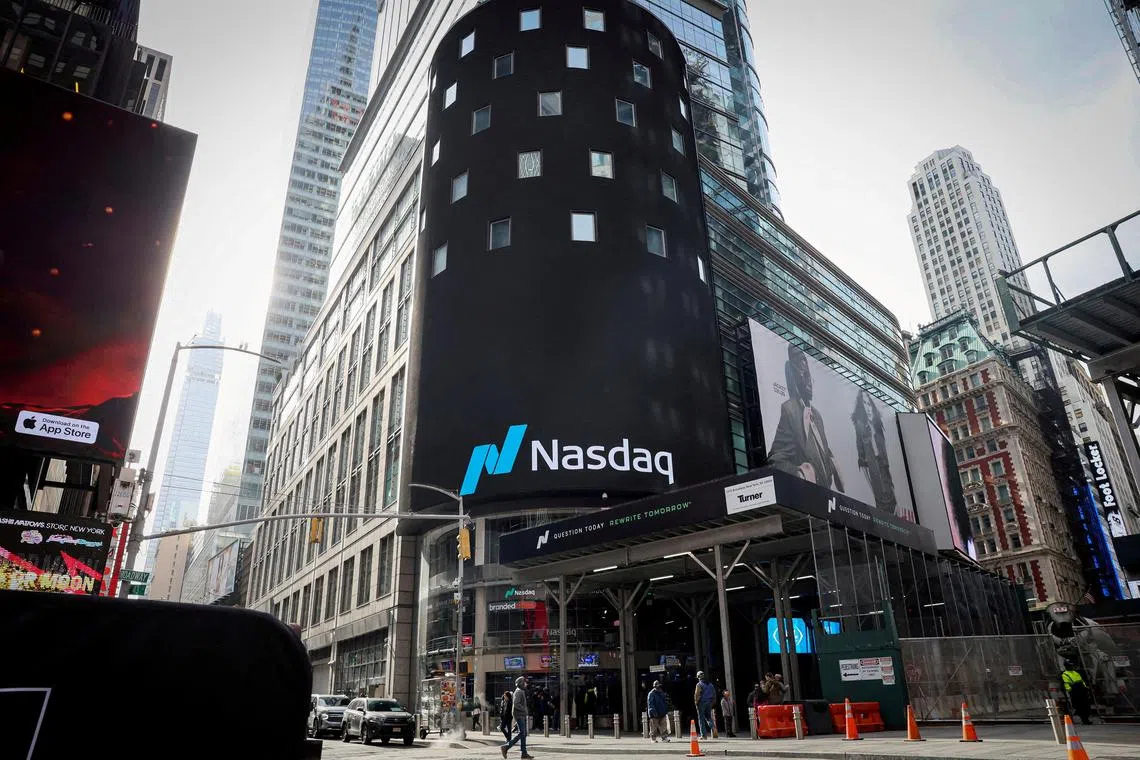AI fever cools, wiping out $1.3 trillion on Nasdaq, with Tesla, Alphabet and more sinking
Sign up now: Get ST's newsletters delivered to your inbox

The Nasdaq indexes tumbled more than 3 per cent for the worst days since October 2022.
PHOTO: REUTERS
San Francisco – Investors soured on the promise of artificial intelligence (AI) on July 24, sparking a US$1 trillion (S$1.3 trillion) rout in the Nasdaq 100 index as questions swirled over just how long it will take for the substantial investments in the technology to pay off.
The Nasdaq indexes tumbled more than 3 per cent for the worst days since October 2022. The list of laggards was a who’s-who of AI technology darlings, led by semiconductor companies such as Nvidia, Broadcom and Arm Holdings.
The sell-off was triggered by a middle-of-the-road earnings report from Alphabet late on July 24 that featured a bloated capital expense. The company’s stock sank more than 5 per cent for its worst performance since January. Tesla plunged more than 12 per cent after chief executive officer Elon Musk offered scant details about his company’s self-driving vehicle initiative.
“The overarching concern is, where is the ROI (return on investment) on all the AI infrastructure spending?” said Mr Alec Young, chief investment strategist at Mapsignals.
“There’s a pretty insane amount of money being spent. Maybe it’ll pay off in a few years. But I think investors realise that the payoff is going to take time to materialise and the hyper scalers earnings are being hurt in the short term by how much they’re spending on it.”
The rout comes two weeks after a cooler-than-expected inflation reading set off a massive rotation from tech winners into companies that would benefit most from US Federal Reserve rate cuts, primarily small capitalisation stocks.
For a fourth straight session – and the 10th time in 11 days – small caps’ performance exceeded that of their larger brethren on July 24. The Russell 2000 is up 0.5 per cent this week compared with a loss of 1.5 per cent in the S&P 500 and 2.6 per cent in the Nasdaq 100.
AI bubble fears
Mr Jim Covello, the head of equity research at Goldman Sachs Group, is among a growing number of market professionals who are arguing that the commercial hopes for AI are overblown and questioning the vast expense required to build out infrastructure required for the computing to run and train large-language models.
Talk of a bubble in AI names was fanned by activity in derivatives markets, where investors piled into bullish options on indexes and individual stocks, especially Nvidia, that acted as rocket fuel during the rally. That sentiment shifted as the rotation from tech picked up speed, and potentially added to the downdraft on July 24.
Last week, for example, demand for bearish puts in Nvidia outpaced calls by the most in five months. Tail-risk hedges that pay out in a stock crash – perhaps as much as a 30 per cent downturn — were rising at the fastest pace since October. And the cost to protect against a retreat at around 10 per cent or so was at the highest level since August 2023.
Tech stock valuations had moved into historically frothy territory. Two weeks ago, the S&P 500 information technology index’s price-to-estimated earnings ratio hit the highest since 2002. Many in the Big Tech group are still priced at nose-bleed levels despite the sell-off.
Nvidia is priced at 36 times profits projected over the next 12 months, compared with an average of 21 in the S&P 500. Apple and Microsoft are both priced at more than 30 times. That’s raised the stakes for earnings at an awkward time, with profit growth for the tech giants set to slow.
While Alphabet’s results dimmed hopes that AI would be a bigger contributor to financial results for megacaps, investors have yet to hear from the rest of the cohort.
Microsoft is scheduled to report on July 30, followed by Facebook’s Meta Platforms, Apple and Amazon later in the week. Nvidia, the biggest beneficiary of AI spending, will be the last to report on Aug 28.
“We are still holding onto our large-cap, quality, growth view,” said State Street macro multi-asset strategist Cayla Seder. “Because even if there is trepidation around tech earnings, they are a more attractive option in terms of earnings growth and fundamental strength.” BLOOMBERG


